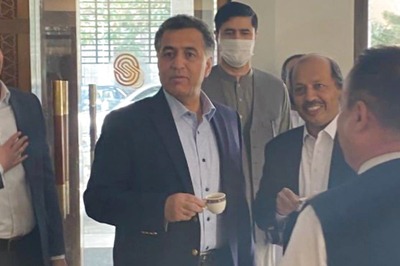
views
New Delhi: Union home minister Rajnath Singh launched the Student Police Cadet (SPC) Programme in Gurugram on Saturday with an aim to inculcate values and ethics in school children.
The idea for the programme, which seeks to build a bridge between the police and the larger community through school students, originated under the CPI(M) rule in Kerala and was later adopted by the Union government.
Among those present at the launch of the scheme was the chief architect of the project, P Vijayan. A 1999 batch official of the Indian Police Service, Vijayan currently serves as IGP, Kochi Range.
The officer spoke to News18 on the national roll-out of his pet project and why it is different from Israel’s model of inculcating discipline.
Q. The SPC Programme was rolled out in Kerala in 2006 and has survived different political regimes to reach the national level.
A. The programme started in Kerala on a small scale and soon, the state government took over. Today, we are seeing the national level roll-out of the scheme, which has been supported by all governments over the years. The scheme was started by the CPI(M), later supported by the Congress government, and is again being aided by the CPI(M) government under Pinarayi Vijayan.
In 2013, Prime Minster Narendra Modi, who was then the chief minister of Gujarat, had sent a team to Kerala to study the model. The next thing we heard was that the Gujarat government was rolling out the programme. Other states such as Haryana and Rajasthan also followed. So far, all states have visited Kerala to study the project. In 2016, home minister Rajnath Singh spent three hours at one of our programmes. He visited us again with the officials of ministry of home affairs to work on the project.
I must say the greater cause has won over politics. The scheme was started by the communist government, mandated by the Congress, and taken over at the national level by the BJP-led Union government. This means there is unanimity in opinion over the issue of discipline and youth.
There are 40 crore children in our country, which is more than the population of US and Europe. They are an asset, and if they come up as smart, responsible students, we don’t need nuclear power to become a superpower. They will make us a superpower with their sense of purpose and discipline in life.
Q. The programme has been compared to the military model practised in Israel. What do you have to say about that?
A. We all agree on the need for a disciplined society. The basic problem today is indiscipline among the youth. There is a serious difference between the models practised in Israel and India.
Ours is the largest democracy in the world and we focus on training our children as responsible, smart citizens. In a democratic society like ours, we cannot say go for military training. Police is basically a civil force, our model involves the police, which is the guardian of democracy and its primary job is the enforcement of law. Law is enacted by the people, of the people, for the people. We tell people, ‘It is your law so learn to abide by it’. This is not a forced programme, it came in a small way in one or two schools and expanded due to the internal urge in people. The demands for SPC in schools has increased.
Q. How do you see the journey of the programme from the state to the national level?
A. Four independent studies were conducted by the State Institute of Educational Management and Training, Kerala, State Council of Educational Research and Training (SCERT), KPMG and Kerala Planning Board to assess the impact of the programme. The children have shown behavioural changes apart from adopting a law-abiding nature.
Most of the children covered under the scheme are from government or government-aided schools. There has been a marked improvement in their level of confidence and behaviour and they have a sense of purpose. They think in terms of giving something back to society and organise events such as campaigns for road safety, cleanliness and plastic ban. We have 88 candidates being trained in every school.
Q. How does the model work in Kerala?
A. There is a well-structured, school-level advisory committee where the inspector of police is the convener. The committee includes two functionaries from the school and two from the police. We train two teachers as community police officers, and then they are given a uniform and an honorary sub-inspector rank. The teachers are provided basic training. Indoor classes are conducted by the teachers, while the police manages the physical activities. The field visits are conducted by both.
There is also a Guardian Student Police Cadre, which provides training for parents. The structure has the district collector as the patron and all the heads of the departments are a part of it. In the state-level advisory committee, we have the state police chief and the state education secretary, so it is not only a police programme. It is a participatory model in which the role of civil society is important.
Q. There have been positive reports on the project, but what kind of problems do you face in running this programme? Also what are the future plans?
A: Getting sufficient personnel is the main challenge. There are two schools per police station at present. We are trying to fill the gap in availability of personnel by retaining officers and offering them an honorarium for their services. We also get senior cadre officers with us. By doing this, we are able to compensate for the shortage of experts. In Kerala, we have a circle system. There are 200 circle officers and one police personnel per circle. The requirement though is of 350 officers of different ranks. The programme has shown good results so the government is also planning to set up a directorate for SPC. A major boost to the project is in the offing.



















Comments
0 comment